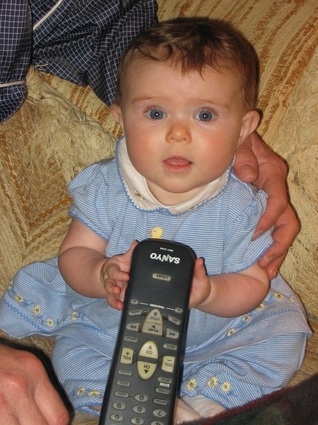
Aramaic is an ancient language that was likely spoken by Jesus and his followers. Although the New Testament was originally written in a form of Greek, a few Aramaic terms are retained.
And my Reese spoke Aramaic. Well, she spoke a word of it. I very distinctly remember hearing her say on a number of occasions, “Abba. Abba. Abba. Abba.”
Before Abba was the American Blind Bowling Association or the name of a 1970s Swedish pop music super-group, it was an Aramaic term for “father.” Usually it is thought to be a term of familiarity, and so it sometimes is compared to the English words “Dad” or “Daddy” or maybe even “Pop.”
Jesus used it in reference to God. And building upon Jesus, the Apostle Paul used the word in reference to God. In fact, Paul encourages us to do so as well. Here is Paul from his letter to the congregations of the church in Galatia:
But when the time had fully come, God sent his Son, born of a woman, born under law, to redeem those under law, that we might receive the full rights of sons. Because you are sons, God sent the Spirit of his Son into our hearts, the Spirit who calls out, "Abba! Father!" So you are no longer a slave, but a son; and since you are a son, God has made you also an heir.
Paul writes this to men and women. So, “son” is not intended to exclude women. What is intended is that because of our connection to Jesus we don’t just have the ability to refer to God with shake-in-our-shoes terms like “Almighty.” We can also use familial, relational, comfortable terms that are taught us by our toddlers. We can say, “Abba.”
So there. My daughter spoke Aramaic. When she said, “Daddy,” I said, “Yes.” When she said, “Abba,” I also said, “Yes.” I imagine God said, “Yes,” as well.
The reason I mention all this is that the term “Abba,” like the more familiar word “Dada,” is a sound that can be made by a baby. We need not be mature to say the word. By implication, we don’t have to be all grown up to address God. We need just call out for God like we have since we were all small children.
I don’t know about you, but I often live too much in my head. I think too much, talk too much, fixate too much upon “adult problems,” and give too much weight to “mature” thought in comparison to “childish” thinking. Having so often come from this place, it was good to hear my daughter babble a biblical name for God without thinking it through or really knowing what she was saying.
It is good to be reminded that the presence of God is not just there beginning when we are mature, rational, adult, tax-paying type folk. The presence of God is there from the very beginning of the journey of our lives helping us to grow in thought, feeling, and action. The word “grace” has a lot to do with these types of things, and I too easily forget about grace.
I suppose God’s way is a bit like the way I am there for Reese. Before she could write a sentence in correct English about me, I was there. Before she even really knew what she was saying, she was crying out my name. And I said, “Yes. I am here, my child.”
We often talk about children as the future – the future of the country, the future of the church, the future of whatever we currently see ourselves as the present of. But I think this saying can obscure as much as it reveals.
Reese is perhaps a future leader of the church. She is perhaps a future parent in the church. Or a teacher. Or a missionary. Or a business leader. Or a musician. Or a whatever. But Reese is also a part of the church’s present, and she has long been so, even before her baptism a year or so ago.
Jesus talks of letting the little children come to him, and the church is simply the people who come to him, little and otherwise. Some of us are young and some old, some serious and some silly. Some of us come to him easily and some only after long struggle. Some of us come preaching long, scholarly sermons and some of us just say “Abba!”
Jesus called Reese, and she came to him, even as a small child. As a small child Reese also called out to God. And that places her on the same level I hold at the foot of the cross, the same level I hold in the heart of God. So I stand beside her, and maybe I stand beside you. May we all stand as one and cry “Abba!” together. That and nothing more is, in essence, what it means to be church.
I love you, Abba. No matter how old I get or how far I feel from you, thank you for loving me and for loving the whole world in Jesus. Help me to grow up to be more like him. Amen.
 RSS Feed
RSS Feed